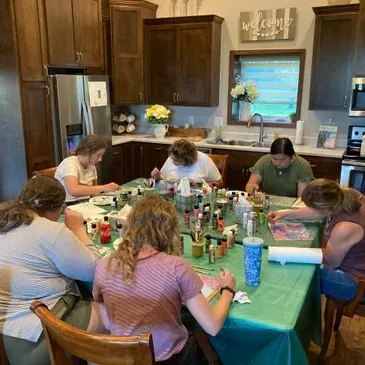What to Say to Someone Who Is Grieving
Supporting someone after the loss of a child can feel overwhelming, and you might worry about saying the wrong thing. The most meaningful thing you can say is simply, "I'm here for you," and to let them know you care—even if you don’t have the perfect words. Letting your friend or loved one know you’re present and willing to listen makes a real difference during this painful time.
It’s common to feel unsure about how to approach someone grieving such a profound loss. You don't need grand or eloquent speeches—just heartfelt sincerity. Sharing honest, compassionate words might feel small, but they matter more than you realize, and sometimes, just sitting in quiet support is enough.
If you're not sure exactly what to say or do, you’re not alone. We’ll share practical suggestions to help guide you through these difficult conversations and offer comfort to those who need it most.
How to Offer Comfort to Someone Who Is Grieving
Losing a child can leave someone feeling isolated and overwhelmed by pain. The things you do and say can help provide comfort, reassurance, and a sense of support along a difficult journey.
Understanding the Grieving Process
Every person grieves in their own unique way and on their own timeline. There’s no right or wrong method for coping with the loss of a child. You may notice intense emotions such as sadness, anger, confusion, guilt, or even numbness.
Grief often comes in waves and can be triggered by memories, places, or dates. Some people need to talk about their child, while others may need quiet and space. It’s helpful to remember that your presence and patience can mean much more than any words of wisdom.
If you’re uncertain how to respond in the moment, simple acknowledgment is best. Saying things like, “I’m so sorry,” or “I can’t imagine what you are feeling,” shows empathy.
The Importance of Presence
One of the most valuable gifts you can offer is your presence. Sitting in silence, holding a hand, or offering a listening ear communicates support without the need for explanations.
Let the grieving person set the pace. If they want to talk, listen without judgment or interruption. If they want quiet, respect that need. Avoid trying to “fix” feelings or offer quick solutions—sometimes just being nearby is enough.
You can also help by offering practical support:
- Bring over a meal
- Take care of errands
- Help with household tasks
- Accompany them to appointments
A gentle reminder: simply showing up—without expecting to make things better—can bring genuine comfort.
Expressing Love and Support
Simple statements like, “I’m here for you,” or “You are not alone,” can be deeply reassuring. Avoid clichés or comments meant to speed up the grieving process. Focus on expressing understanding and care.
Text messages, cards, or handwritten notes are also meaningful. Share memories of the child if it feels appropriate. Respect the grieving person’s wishes if they don’t want to talk, but let them know your love and support are unconditional.
What to Say to Someone Who Is Grieving
Losing a child can bring about some of the deepest pain a person may face. Your words and actions can provide comfort and reassurance, support healing, and help someone feel less alone during grief.
Helpful Phrases and Words of Encouragement
When talking with someone who is grieving, simple and sincere words are often the most supportive. You might say, “I’m so sorry for your loss,” or “I can’t imagine what you’re going through, but I care about you.” It’s okay to admit you don’t have all the answers or the right words.
Let them know you’re available by saying, “If you need to talk or just sit in silence, I’m here for you.” Avoid clichés or trying to explain why the loss happened, as that can unintentionally hurt. Empathy and presence matter more than finding perfect words.
It’s sometimes helpful to offer practical support alongside encouragement, such as offering to help with meals or daily tasks if you’re able. The key is to be genuine and let your words be a bridge to connection and understanding.
Here are a few phrases that can help:
- “I’m thinking of you.”
- “I’m here whenever you want to talk.”
- “This must be so hard for you.”
Giving Permission to Grieve
Grief doesn’t follow a set timeline, especially after a child’s death. Remind your loved one that their feelings—anger, sadness, guilt, or confusion—are all part of the grieving process.
You can offer support by saying, “It’s okay to feel however you need to feel,” or “Take all the time you need. There’s no right or wrong way to grieve.” Validating their experience helps foster mental health and gives them permission to process emotions at their own pace.
If someone is worried about expressing their emotions, assure them that grief is not something to “get over.” Remind them that taking care of their needs is important, and that accepting support is a healthy part of healing.
A supportive environment reduces pressure to “be strong” or “move on.” Encourage self-compassion and patience, emphasizing that healing looks different for everyone.
Listening Without Judgment
Listening attentively is one of the most valuable gifts you can offer. Sometimes, the grieving parent may want to share memories, express frustration, or even sit together without speaking at all. Make sure you are fully present, turning off distractions and giving your undivided attention.
Let them guide the conversation. Say things like, “I’m here to listen, not to judge,” or “Share whatever you need. I’m here for you.” The goal is to create a safe space where they feel respected and accepted in their grief.
Avoid offering quick solutions or trying to minimize painful emotions. Instead, reflect their words with understanding responses such as, “That sounds so overwhelming,” or “It’s okay to feel that way.”
By providing attentive listening and resisting the urge to “fix” their pain, you show true encouragement, helping your loved one feel seen and supported during a difficult journey.
What Not to Say or Do During Grief
Supporting someone who has lost a child is hard, and words matter. How you respond can help or unintentionally hurt, so being mindful about language, actions, and common mistakes is important.
Avoiding Platitudes
When someone is grieving their child, common phrases intended to comfort can feel empty or even painful. Platitudes like “everything happens for a reason,” “they’re in a better place,” or “at least you had time with them” might minimize the depth of loss. These statements, while well-meant, often block real connection and understanding.
Instead of using clichés, acknowledge the pain directly. A simple “I’m so sorry” or “I wish I had the right words” is usually more meaningful. Resist the urge to fix the grief or provide explanations, as this shows respect for the parent’s unique experience. If you’re unsure, listening quietly is usually better than speaking.
Addressing Anger and Difficult Emotions
Grief after the loss of a child can bring waves of anger, guilt, regret, or confusion. Avoid telling a grieving parent how they “should” feel or advising them to “stay positive.” Statements like “you have to be strong,” or “don’t be angry” invalidate genuine emotions. Grief is not a linear or predictable process.
It is okay—and actually normal—for a parent to express strong feelings or even rage without needing to justify or explain them. You don’t have to have solutions or make the anger go away. Instead, sit with them in those moments and simply express, “I’m here for you, whatever you feel.”
Empathy means giving space for those hard emotions. If you feel uncomfortable, it’s still better to witness pain than to silence or downplay it. Honest presence is what most grieving parents want.
Recognizing Common Mistakes
Common mistakes usually happen when people try too hard to make sense of the loss or compare it to their own experiences. Avoid saying, “I know how you feel” or referencing your own losses. Each loss is unique, and comparisons can feel dismissive or self-focused.
Questions about “moving on” or suggestions to “stay busy” may come from a good place, but they often show a misunderstanding of how intense and long-lasting grief can be. Do not put a timeline on someone’s healing.
Be mindful of your nonverbal communication. Awkward silence, withdrawing, or changing the subject can be hurtful. Simply offering a listening ear, a gentle touch on the shoulder, or letting someone talk at their own pace shows you care.
Respecting Different Grieving Experiences
Every person’s journey through grief is shaped by their relationships, beliefs, and circumstances. Knowing how to respond appropriately can provide immense comfort without adding to someone’s pain.
When Grief Involves Illness Like Cancer
When a child is lost after an illness such as cancer, grief often comes layered with exhaustion and trauma. It helps when you acknowledge the difficult journey the family has been through, rather than focusing only on the end result. Simple statements like, “Your child fought so hard, and you did everything you could,” honor the struggle and effort involved.
Be mindful not to offer clichés or suggest that everything happens for a reason. Instead, ask if they want to share memories about their loved one or talk about what their child meant to them. Some families may want to discuss the illness openly, while others might not. Follow their lead and respect what they’re comfortable sharing.
Grief in the Context of Faith or the Bible
Many people turn to their faith for comfort in times of loss. For them, using supportive words rooted in their beliefs can offer hope. You might say, “I’m praying for you and your family,” or share a Bible passage that speaks of comfort, such as Matthew 5:4: “Blessed are those who mourn, for they shall be comforted.”
If you’re unsure about their beliefs, you can express support without specific references: “I am holding you in my thoughts and prayers.” Avoid suggesting that grief should be resolved quickly because of faith. Honor their journey at their own pace and remember that spiritual support may look different for everyone.
What to Say at a Funeral
Funerals can feel overwhelming, and many people worry about saying the wrong thing. It’s okay to keep your words simple and heartfelt. When you speak to the family, phrases like, “Your child touched so many lives,” or “There are no words, but I care deeply,” show empathy without pressure for conversation.
Respect the family’s space. Offering a hug, if appropriate, or simply being present often speaks louder than any phrase. If you’re writing in a guest book, share a favorite memory or a message of support.











